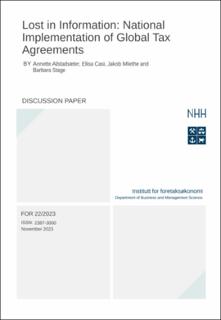Lost in Information: National Implementation of Global Tax Agreements
| dc.contributor.author | Alstadsæter, Annette | |
| dc.contributor.author | Casi, Elisa | |
| dc.contributor.author | Miethe, Jakob | |
| dc.contributor.author | Stage, Barbara M. B. | |
| dc.date.accessioned | 2023-11-13T09:58:15Z | |
| dc.date.available | 2023-11-13T09:58:15Z | |
| dc.date.issued | 2023-11-13 | |
| dc.identifier.issn | 2387-3000 | |
| dc.identifier.uri | https://hdl.handle.net/11250/3102121 | |
| dc.description.abstract | We study how national implementation of global tax agreements shape their effectiveness by focusing on the multilateral agreement on automatic information exchange on financial assets, the Common Reporting Standard (CRS). We create a new database on country-level enforcement which we combine with 1) micro-level data on cross-border bank transfers to Norway with unparalleled detail on hidden ownership structures and 2) macro-level data on cross-border bank deposits. Cash repatriation from tax havens increases significantly post-CRS implementation, but only from countries with high enforcement levels. A highly digitized tax administration triggers twice the drop in tax haven deposits compared to paper-based systems. | en_US |
| dc.language.iso | eng | en_US |
| dc.publisher | FOR | en_US |
| dc.relation.ispartofseries | Discussion paper;22/23 | |
| dc.subject | Global Tax Agreements | en_US |
| dc.subject | Tax Evasion | en_US |
| dc.subject | Financial Flows | en_US |
| dc.subject | Tax Enforcement | en_US |
| dc.title | Lost in Information: National Implementation of Global Tax Agreements | en_US |
| dc.type | Working paper | en_US |
| dc.source.pagenumber | 47 | en_US |
Tilhørende fil(er)
Denne innførselen finnes i følgende samling(er)
-
Discussion papers (FOR) [564]
